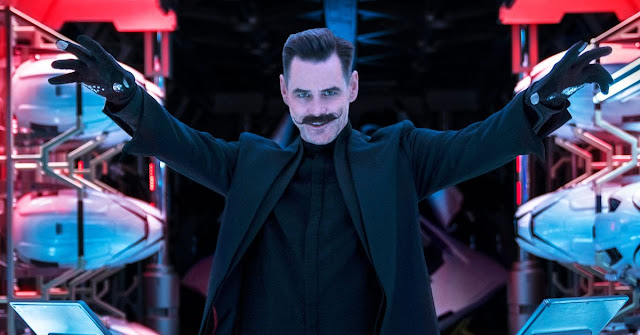Why 'Sonic The Hedgehog' Gave Jim Carrey His First Hit In A Decade
Jeff Fowler's Sonic The Hedgehog became Carrey's first hit in a decade because it reminded adults of when he was Hollywood's leading funnyman
 |
| Jim Carrey in 'Sonic The Hedgehog' (CREDIT: Paramount Pictures/SEGA) |
by Jack Linsdell
Earlier this year, Jim Carrey achieved his first "hit" movie in a decade when he played the lead villain Dr Robotnic in Jeff Fowler's Sonic The Hedgehog. The popular and well-liked video game adaption powered it's way to an impressive $146 million domestic and $306 million worldwide (sans China) total on a mere $90 million budget. Due to Coronavirus-related delays and theatre closures, the James Mardsen/Ben Schwartz flick is still the second highest grossing movie worldwide of 2020 behind Bad Boys For Life ($425 million), and the highest grossing video game movie ever in North America. Sure, the positive reviews, audience "buzz" and being based on a popular video game were key factors in why Sonic was successful. However, it only became a "hit" because of Carrey.
From 1994 to 2009, Carrey was in the peak popularity of his career as Hollywood's unrivaled and leading funnyman. During that time, he could successfully turn any comedy vehicle into a box office smash, bringing audiences to anything and everything purely based on his unique comedic style and huge popularity. In the 1990s, he became one of Hollywood's biggest stars, doing for comedy what Julia Roberts did for the rom-com and Will Smith did for the action flick. By 2010, Carrey was facing competition from a new wave of more R-rated comedy actors like Kevin Hart, Kirsten Wiig and Melissa McCarthy, not to mention a gradual audience shift away from more "real world" adult programmers to four-quadrant, VFX-heavy blockbusters like Avatar and The Dark Knight. His last "hit" movies were the one-two punch of Yes Man (a solo Carrey comedy that earned $273 million on a $70 million budget) and Horton Hears A Who! (a Carrey/Steve Carrel animated feature that earned $298 million on an $85 million budget) in 2008. Sure, he helped push Robert Zemeckis' A Christmas Carol adaption to $325 million in 2009, but that was a bomb because it was too expensive ($200 million).
From 2009-2019, Carrey was not the box office draw he once was and, as a result, he slowed his career down. The closest he came to a hit in this period was in 2014 with the Farrelly brother's Dumb and Dumber To. And even then, the only reason why that earned $169 million on a $50 million budget was because it was the sequel to Carrey's 1994 much-loved comedy classic Dumb and Dumber. Anything "new to cinema" or original didn't stand a chance. Long gone were the days when during the mid-90s, Carrey could open original comedies to blockbuster numbers. Heck, in 1994 he turned Ace Ventura: Pet Detective ($107 million), The Mask ($351 million) and Dumb and Dumber ($247 million) into hits, before being an added value element alongside Michael Keaton and Val Kilmer in Batman Forever ($335 million) in 1995. That year also saw him return as the infamous funny detective in Ace Ventura: When Nature Calls ($212 million), a true breakout sequel. Hits in 1997 with Liar Liar ($302 million) and 1998 with The Truman Show ($264 million) further cemented his status as the king of the comedy genre.
And, that brings us back to Sonic The Hedgehog. The reason why the 2020 video game adaption broke out was due to it having a greater audience appeal beyond being "just another video game adaption" or "just another kid flick". It's success is not just about the appeal and popularity of Carrey, an actor who represents a time when movie stars ran Hollywood, but, also about everything he represents to adults today.
Sonic appealed to adults by playing on their nostalgia for a time when they watched and loved a range of quirky, Carrey comedies in theatres. His over-the-top comedic villainous turn only served to remind adults of why he was Hollywood's leading funnyman for so many years. The fact that both his performance, and inclusion in a popular, modern-day blockbuster served to evoke a time when movie stars not IP or superhero characters ran Hollywood made Sonic The Hedgehog a hit. It appealed to adults beyond just needing to be there because their kids wanted to see it. Ironically, that's also what happened to Will Smith this year with Bad Boys For Life, which reminded audiences of a time they saw over-the-top action blockbusters in theatres rather than on Netfix. Smith experienced a similar slump to Carrey at the same time (with 2008's Hancock being his last original action hit), which makes the fact that both Bad Boys For Life and Sonic The Hedgehog are the top grossing movies of 2020 even more ironic and significant.
Sure, without Carrey, Sonic would have still been a success. But, because this was almost a Jim Carrey comedy vehicle disguised as a video game adaption, Sonic was turned from a success to a hit purely based on the nostalgia it evoked for a time when the comedy was a viable success in theatres. Carrey represents everything good about old Hollywood and theatrical comedies, which in this streaming-based era where Netflix rules the roost, made Sonic The Hedgehog even more unique. The fact that it also ended his decade-long run without a hit movie is also deeply ironic too.


Comments
Post a Comment